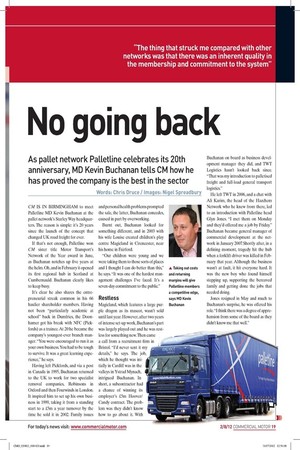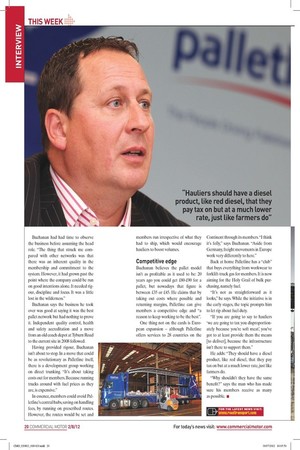No going back
Page 11

Page 12

If you've noticed an error in this article please click here to report it so we can fix it.
As pallet network Palletline celebrates its 20th anniversary, MD Kevin Buchanan tells CM how he has proved the company is the best in the sector
Words: Chris Druce / Images: Nigel Spreadbury
CM IS IN BIRMINGHAM to meet Palletline MD Kevin Buchanan at the pallet network’s Starley Way headquarters. The reason is simple: it’s 20 years since the launch of the concept that changed UK road freight for ever.
If that’s not enough, Palletline won CM sister title Motor Transport’s Network of the Year award in June, as Buchanan notches up ive years at the helm. Oh, and in February it opened its irst regional hub in Scotland at Cumbernauld. Buchanan clearly likes to keep busy.
It’s clear he also shares the entrepreneurial streak common in his 66 haulier shareholder members. Having not been “particularly academic at school” back in Dumfries, the Doonhamer got his break with NFC (Pickfords) as a trainee. At 20 he became the company’s youngest-ever branch manager. “You were encouraged to run it as your own business. You had to be tough to survive. It was a great learning experience,” he says.
Having left Pickfords, and via a post in Canada in 1995, Buchanan returned to the UK to work for two specialist removal companies, Robinsons in Oxford and then Fourwinds in London. It inspired him to set up his own business in 1999, taking it from a standing start to a £5m a year turnover by the time he sold it in 2002. Family issues and personal health problems prompted the sale, the latter, Buchanan concedes, caused in part by overworking.
Burnt out, Buchanan looked for something different, and in 2003 with his wife Louise created children’s play centre Magicland in Cirencester, near his home in Fairford.
“Our children were young and we were taking them to those sorts of places and I thought I can do better than this,” he says. “It was one of the hardest management challenges I’ve faced. It’s a seven-day commitment to the public.”
Restless
Magicland, which features a large pur ple dragon as its mascot, wasn’t sold until last year. However, after two years of intense set-up work, Buchanan’s part was largely played out and he was rest less for something new. Then came a call from a recruitment irm in Bristol. “I’d never sent it my details,” he says. The job, which he thought was initially in Cardiff was in the valleys in Ystrad Mynach, intrigued Buchanan. In short, a subcontractor had a chance of winning its employer’s £5m Hoover/ Candy contract. The problem was they didn’t know how to go about it. With Buchanan on board as business development manager they did, and TWT Logistics hasn’t looked back since. “That was my introduction to palletised freight and full-load general transport logistics.” He left TWT in 2006, and a chat with Ali Karim, the head of the Hazchem Network who he knew from there, led to an introduction with Palletline head Glyn Jones. “I met them on Monday and they’d offered me a job by Friday.” Buchanan became general manager of commercial development at the network in January 2007. Shortly after, in a deining moment, tragedy hit the hub when a forklift driver was killed in February that year. Although the business wasn’t at fault, it hit everyone hard. It was the new boy who found himself stepping up, supporting the bereaved family and getting done the jobs that needed doing.
Jones resigned in May and much to Buchanan’s surprise, he was offered his role. “I think there was a degree of apprehension from some of the board as they didn’t know me that well.” Buchanan had had time to observe the business before assuming the head role. “The thing that struck me compared with other networks was that there was an inherent quality in the membership and commitment to the system. However, it had grown past the point where the company could be run on good intentions alone. It needed rigour, discipline and focus. It was a little lost in the wilderness.” Buchanan says the business he took over was good at saying it was the best pallet network but had nothing to prove it. Independent quality control, health and safety accreditation and a move from an old coach depot at Tyburn Road to the current site in 2008 followed.
Having provided rigour, Buchanan isn’t about to stop. In a move that could be as revolutionary as Palletline itself, there is a development group working on direct trunking. “It’s about taking costs out for members. Because running trucks around with fuel prices as they are, is expensive.” In essence, members could avoid Palletline’s central hubs, saving on handling fees, by running on prescribed routes. However, the routes would be set and members run irrespective of what they had to ship, which would encourage hauliers to boost volumes.
Competitive edge
Buchanan believes the pallet model isn’t as proitable as it used to be: 20 years ago you could get £80-£90 for a pallet, but nowadays that igure is between £35 or £45. He claims that by taking out costs where possible and returning margins, Palletline can give members a competitive edge and “a reason to keep working to be the best”.
One thing not on the cards is European expansion – although Palletline offers services to 28 countries on the Continent through its members. “I think it’s folly,” says Buchanan. “Aside from Germany, freight movements in Europe work very differently to here.” Back at home Palletline has a “club” that buys everything from workwear to forklift-truck gas for members. It is now aiming for the Holy Grail of bulk purchasing, namely fuel.
“It’s not as straightforward as it looks,” he says. While the initiative is in the early stages, the topic prompts him to let rip about fuel duty.
“If you are going to say to hauliers ‘we are going to tax you disproportionately because you’re soft meat’, you’ve got to at least provide them the means [to deliver], because the infrastructure isn’t there to support them.” He adds: “They should have a diesel product, like red diesel, that they pay tax on but at a much lower rate, just like farmers do.
“Why shouldn’t they have the same beneit?” says the man who has made sure his members receive as many as possible. n








































